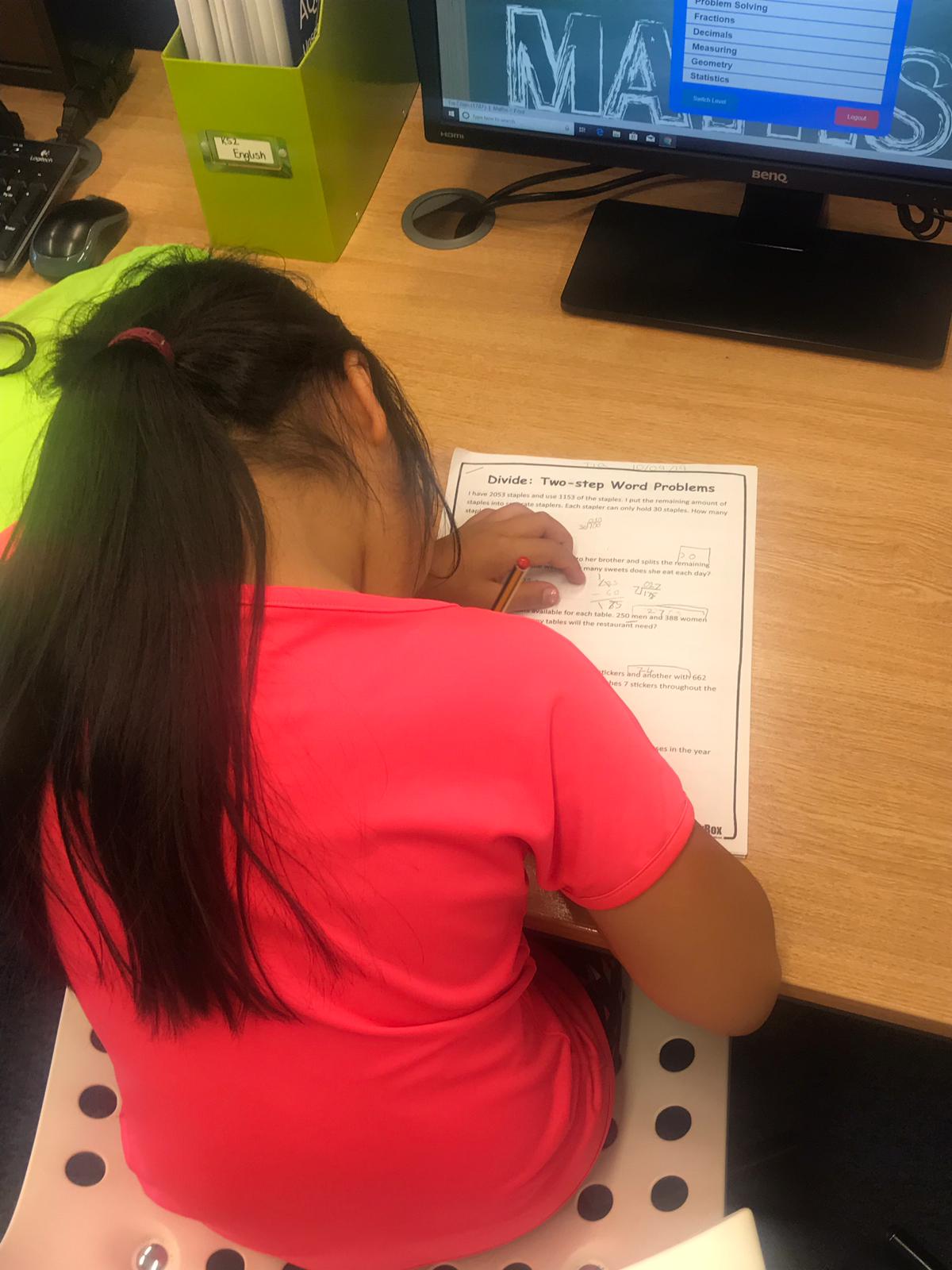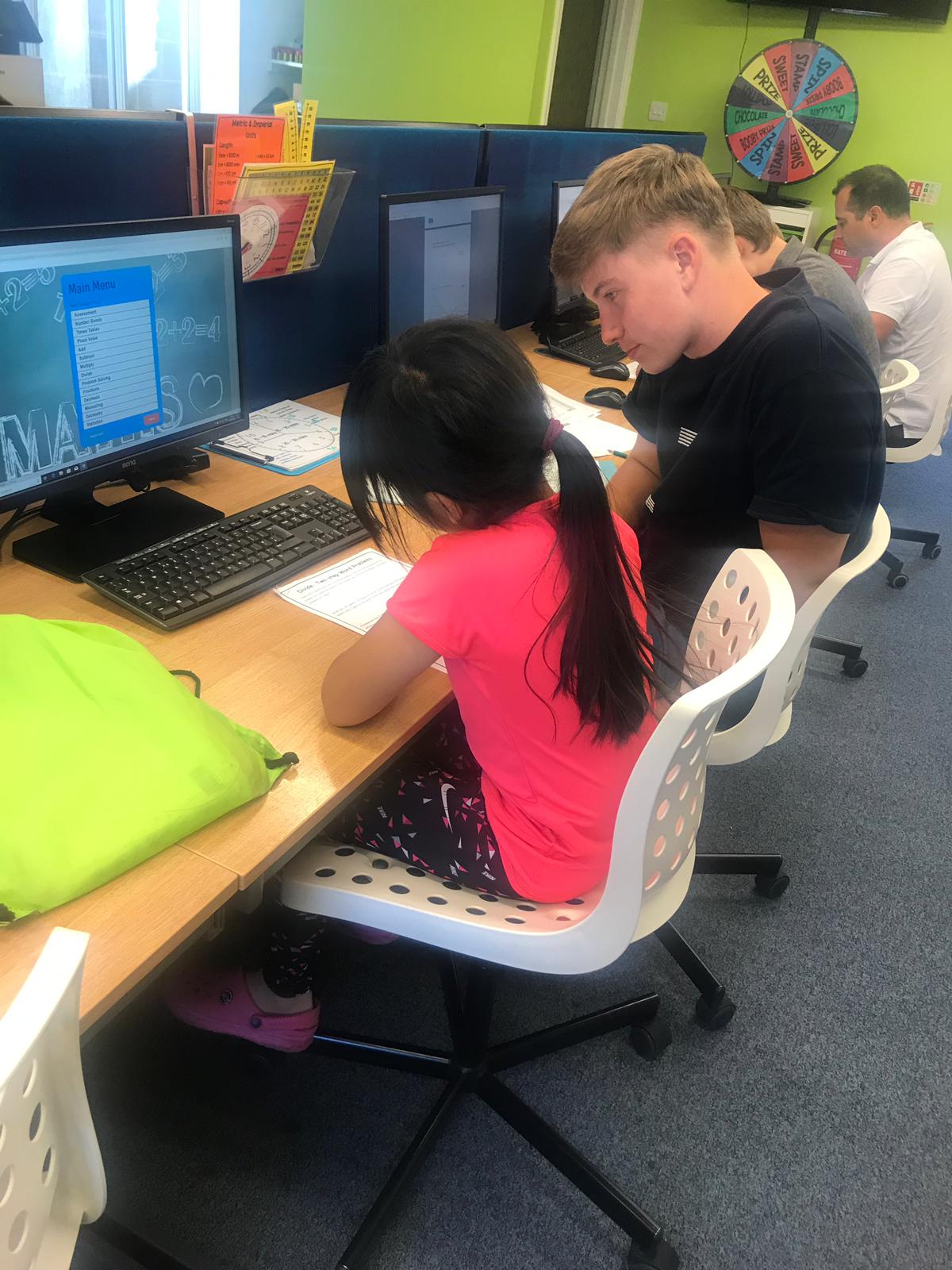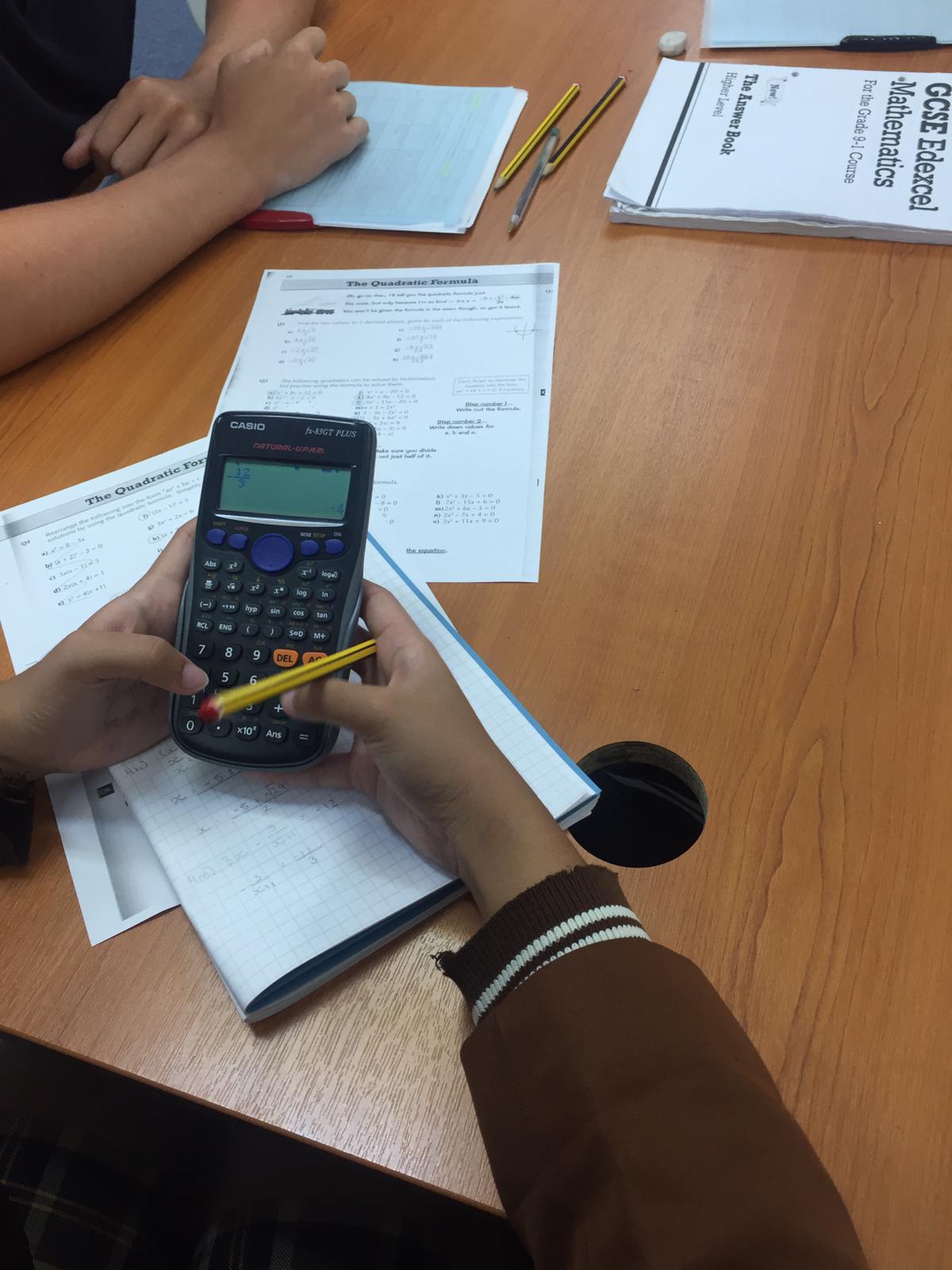5 tips for teaching your children spellings

Learning spellings is important for all children. It is beneficial for many things, including reading, writing and pronunciation.
As a parent you can make spelling fun when testing your children on their spellings at home.
Try our 5 tips for teaching your children spellings:
1. Group words with similar spelling patterns so they can be remembered easily.
For example, words ending in -ough can be grouped together: tough, rough, enough, cough… This will help your child with letter patterns, too!
2. Colour code spellings for easier memorisation
By colour coding spellings it makes them more visual and fun to learn. You can group spellings with different colours, for example grouping the same letter patterns can help these to be remembered easier.
3. Keep a record of the spellings your child finds challenging. Then you can test these spellings repeatedly until your child gets them right.
You can keep a note of the trickier spellings so they can be referred to and practiced regularly.
4. Carry out regular spelling tests with your child.
By doing a spelling test every week their spelling should improve. This will teach them a range of new spellings. Try to vary them, so there is a variety of different word being learnt.
5. Why not try spelling games?
- You can play spelling catch. Throw a ball to your child and shout out a word. They must then spell that word once they receive the ball.
- Hangman is good for learning spelling. Start off by thinking of a word. Write the amount of lines in place of where the letters for the word would go. Then the other players must guess one letter at a time. You must make a hangman gradually for every letter that is guessed incorrectly. Every letter that is correct goes on the lines to make the word. You can use trickier spellings, allowing your child to spell out the word.
- Or give your child a spelling. From this spelling, they must spell a new word from the last letter of that spelling. This should result in a long list of words!
- For example:
Because
Element
Tedious
Suspicious
7 Educational skills to teach your child

Whilst many parents are spending valuable time at home with their children, why not try to teach them those all-important life skills.
Life skills will benefit children later in life, so it could be useful to implement these early on.
They will teach your child valuable qualities, including being independent, taking care of themselves and learning.
According to Ellen Galinsky’s Mind in the Making there are 7 important life skills:
-
Focus & Self-Control
- Children pick up habits and routine from a young age. So why not teach them how to focus and have self-control.
- Focus is to do with being alert and devoting attention to one task at a time. You can help to improve your child’s focus by dedicating time for them to complete their work. This means they can use this amount of time to concentrate on what needs to be completed in that timeframe.
- Self-control is about willpower and being aware of your own actions.
- Ways to practice this can be teaching children to avoid temptation, for example limiting time on electronic devices like tablets or watching television. This will teach children that these are a privilege.
-
Perspective-talking
- This is about encouraging children to think from different viewpoints. By considering multiple perspectives asides from their own, they can gain an all-round view.
- You can try instigating this by asking about the character’s in a book they are reading. Ask your child: what made the character do that? What made them feel the way they are feeling?
- This will develop critical thinking, as well as empathy towards others.
-
Communication
- Children need regular communication in order to develop social skills and form healthy relationships in life.
- Asking your child anything, about how they are, or how their day was, will improve their communication and build upon their social skills.
- It will also help them to express themselves better and improve their development.
-
Making connections
- Making connections means recognising the connections and patterns in everyday life. It is making associations between certain things, like thought processes or ideas.
- You can encourage children to make connections by asking them what they think they should wear in rainy weather, for example. Children should make the connection between wearing a coat in order to keep dry as a result of the rain.
-
Critical thinking
- Critical thinking is making decisions based on judgements. It is an important skill which your child will use throughout their life.
- Try asking your child open-ended questions, like “What do you think?” or “How do you feel about it?” This will encourage them to justify their though process.
- This will develop children’s decision making and forming judgements.
-
Taking on challenges
- This teaches your child that it is okay to make mistakes. By taking on challenges, children can grow and try new things.
- This could be trying something new around the house, like gardening or helping you cook.
- Children will learn to be open minded and diligent.
-
Self-directed, engaged learning
- It is important for children to enjoy learning. They won’t like every subject or task that they do, but you can help them to find what they enjoy.
- Encourage their love of learning by going through work with your child, as well as trying to limit time spent on electronic devices. This can be replaced with reading or playing educational games.
3 ways to improve children’s memory from home

Improving your children’s memory from home can be simple and fun. There are many games and tricks to try out, like StudyBox’s 3 ways to improve children’s memory from home.
There are many games and activities to improve muscle memory, association and visualisation.
These will help children to actively engage whilst improving their memory.
Try these 3 ways to improve children’s memory from home:
Active reading
- Active reading is when children are involved with reading the text. This heightens the learning process whilst reading.
- There are many different strategies to try:
- Writing down new words or highlighting them.
- Reading aloud, to improve pronunciation.
- Critical thinking and questioning the narrative.
- Identifying literary devices, for example: alliteration, personification, hyperbole…
- Engaging with the text improves memory through active reading.
Word games
- Playing word games with children is free and easy.
- There are many word games for improving memory.
- The game ‘I went shopping and I bought…’ involves saying an item which can be found in the supermarket. Then the next player repeats the sentence and adds an item. As the game goes on, the players have to remember a long list of items, and repeat them, whilst adding on a new item each turn.
- This encourages all players to concentrate, as well as remember the long list of items.
Card games
- Playing card games, like ‘Memory’ can help to improve muscle memory.
- It involves turning placing the deck of cards spread out on a surface face down. Then take it in turns to turn over two cards at once. The participants must remember which cards have been turned over. Once two pairs of the same numbered care are turned over, the player can take the pair.
- This game improves concentration and focus. The players must memorise as many cards as possible in order to turn over pairs and complete the game.
Visualisation
- Visualising what is being taught can help children to remember more effectively.
- It allows what is being learnt to be associated with an image, which can be easily remembered.
- Children can associate images with what is being memorised.
- For example, children can create a mind map, which can be colour coded, or images can be drawn relating to the subject being memorised.
Teaching your child equivalent fractions

Fractions are important for children to learn, they are taught on school syllabus, as well as useful for day-to-day life. the first step is teaching your child equivalent fractions.
Equivalent fractions are fractions with different numerators (the number at the top) and denominators (the number at the bottom), but they represent the same values.

- For example, 1/2 , or one half, is the same as 2/4, or two quarters.
- This is because 2/4 will reduce to 1/2, which is its simplest form.
- They both represent the same value, they are just written differently.
So, equivalent fractions are fractions which look different from each other but they are the exact same value.
- 2/3 is the same as 4/6.
- This is because the numerator 2 goes into 4 twice.
- The denominator 3 also goes into 6 twice.
So:
2 x 2 = 4
3 x 2 = 6
This would become 4/6.
- It’s the same as 1.
- Take 1 to be 100, or one whole.
- Therefore, 1 is the same as 3/3, which is a complete fraction.
- This is because the numerator and denominator are the same.
Teaching your child equivalent fractions at home is simple once you break it down.
Knowing that the fractions are the same value, but written differently is the most important rule.
Once this has been taught, then you can provide examples and explain why they are the same values.
5 ways to support your child’s learning from home

Have you ever wondered as a parent how you can help your child with their learning?
There are many ways to support your child’s education from home, from setting a routine, to assisting with schoolwork.
Try these 5 ways to support your child’s learning from home:
Read together
Reading for pleasure with your child is beneficial for a number of reasons. It can expand their vocabulary, help pronunciation and boost creativity. If your child doesn’t need assistance with reading, try encouraging them to read a book for fun.
Go through schoolwork
Take time to go through what your child is currently learning at school together. This can help them understand the material better and memorise it by going over it again. You can ask your child if they are finding anything challenging. You can also encourage them in the areas they are good at.
Teach your child life skills
Activities like cooking and baking with your children will teach them valuable life skills, as well as being a fun activity to do together. There are plenty of useful activities that you can do together, like gardening, even household chores like tidying and hoovering.
Explore new hobbies
Take the time to introduce new hobbies and help your child to find something that excites them. This can also be a nice activity that gives them a break from television, smartphones and tablets. Try asking them what they enjoy, whether they like drawing, sports or cooking, the options are endless!
Play educational games
There are many educational games you can play at home with your child, for example, like sudoku and crosswords, which you can find printouts of online! There’s also scrabble, which is good for helping with spelling and vocabulary. You can also make up your own word and number games to play.
3 ways for your child to practice mindfulness

Mindfulness and positivity goes a long way. Which is why it’s important as a parent to encourage children to practice mindfulness alongside education.
It is beneficial for a number of reasons, including keeping calm, remaining positive and organising thoughts. Implementing this technique with children will be beneficial for their education and learning.
Here are 3 ways for your child to practice mindfulness:
Positive mindset
- Help your child to have a can-do attitude in their daily life.
- Encouraging positive thinking and developing the right thoughts.
- Reducing stress by controlling thoughts and feelings.
- Talking to them about any issues that are bothering them.
Meditation
- Controlling your child’s way of thinking.
- Taking time out of your child’s busy routine to reflect upon their day.
- Engaging the self with deep breathing.
- Teaching them to analyse what went well and what could have gone better.
Extra-curricular
- Finding something that your child loves to do in their spare time.
- Having a break from education and school work.
- Reducing stress through hobbies, such as physical activity or arts and crafts.
- Not only improves upon skills, but takes away pressure from academia.
Mindfulness is a useful technique which has a number of benefits. It is a way of controlling and regulating thoughts, boosting positivity and self-reflection.
Encouraging children to practice mindfulness will benefit their education, so why not try implementing our 3 ways for your child to practice mindfulness.
It is a way of relieving stress and remaining positive during those stressful exams and assignments.
It is also important as a parent to practice mindfulness. If you demonstrate being mindful, your child will most likely learn from the parent’s behaviour.
3 ways to kick-start your child’s revision

Exam season is fast approaching, and whether it’s SATs, GCSEs or the 11+, your child will start preparation soon.
It’s normal for children, as well as parents, to worry about exams!
But with the right revision and preparation, revision has never been so easy…
Here’s 3 ways to kick-start your child’s revision:
Planning
- Mapping out the time before your child’s exams will provide an indication of how long there is for completing revision.
- You can make a timetable together and record the key exam dates.
- Try adding a schedule to the timetable, like how many hours to spend revision and on which days.
- Don’t forget to include study breaks on the timetable, too!
Create a study environment
- Dedicate a special place where your child can revise and complete schoolwork.
- Creating a quiet and secluded environment will ensure that there are no distractions.
- This means that information can be retained easily and work completed effectively.
- Make sure they have all the supplied needed for studying so they won’t have to get up and get distracted.
A healthy lifestyle
- Helping your child maintain a healthy lifestyle will benefit them when it comes to schoolwork.
- Setting a time for bed every night will create a routine and ensure they are not tired for a productive day’s work!
- A balanced diet also has an impact on the body and mind. This includes fruit, vegetables, fish, meat and carbohydrates. Nutritious breakfasts are also important in the lead up to and the morning of exams.
- Don’t forget to encourage them to drink lots of water, too!
Exam season doesn’t have to be daunting, and with the right planning and preparation your child will feel more confident.
3 ways to kick-start your child’s revision will help with their work ethic and organisation.
It’s not just about revision, it is also important to maintain a healthy lifestyle and have a peaceful setting to revise in.
3 effective ways to improve your child’s concentration

Understanding how children learn and memorise information can help us to improve their education.
The way that children’s brains are wired is completely different to adults, which is why children’s attention spans are typically shorter.
Have you ever wondered how you can improve your child’s attention span so that their focus can improve when learning?
Try our 3 effective ways to improve your child’s concentration:
Playing focus games
You can make learning fun by incorporating games into daily activities. Try playing card games like ‘Memory’ or puzzles like Sudoku or Crosswords, these will improve attention span as well as focus. If you take away electrical gadgets like smartphones and tablets it will be less distracting, allowing your child’s concentration to be solely on the activity.
Create a distraction-free zone
By creating a distraction-free environment, your child will have somewhere dedicated for studying and completing work. This is a space where they can focus on the task they are completing without being tempted by the TV, mobile phones or other distracting electronics. Create an environment that is comfortable and calming for your child so that it makes the tasks enjoyable. If they concentrate best by listening to calming music, then why not try putting on soft background music. Make sure everything that your child needs is accessible so they don’t have to get up and search for anything.
Set a routine
By creating a timetable for daily activities, your child will have a structure to follow and know what they need to complete. If there’s a set time for completing homework, having dinner and other activities like reading, it can help to program their mind so they are aware of what they need to get done. This will also help with time management and organisation!
You can help your child with their concentration skills a number of ways! Training children’s brains to focus is something that will benefit them throughout their life. Concentration can be improved through brain training games, creating a peaceful environment for completing tasks and setting a routine to follow.
3 ways to help your child at home with their work

As a parent, there are many things you can do at home to help your child with their school work.
If you’re wondering what you can do to improve education, why not try our 3 ways to help your child at home with their work:
Healthy Lifestyle
- Ensure your child is getting enough sleep. It’s recommended that children need between 8 and 12 hours of sleep every night.
- A healthy, balanced diet will improve the way your child functions. For example, calcium and Vitamin D helps strengthen bones and growth, iron is good for cognitive ability and Omega 3 helps the brain to function.
- Lots of fruit and vegetables are important, as well as meat, fish and wholegrains.
Routine
- Establishing a routine for your child will help them be organised and have structure in their day-to-day life.
- This can be making sure they pack a school bag the night before, completing homework the day it is set and having a regular bed time.
- Try setting a morning routine: enough time for having breakfast, brushing teeth and getting dressed. And an evening routine: set a time for completing homework, a set dinner time and time for winding down in the evening.
Education
- Reading with your child at home will improve vocabulary, imagination and pronunciation. You can read a few pages per night together. If they are confident reading alone, then try encouraging them to read a few pages of a book every night before bed.
- Complete homework together. You can teach them new concepts and provide any extra help when needed.
- Additional tuition. If there’s any subjects that are more challenging over others, why not consider after-school tuition? At StudyBox, we provide 1-1 support with tutors tailored to each individual student.
There are plenty of opportunities as a parents to help your child at home with their education.
Try our 3 ways to help your child at home: assisting with schoolwork, setting a routine to help time management and completing tasks, and maintaining a healthy lifestyle by getting plenty of sleep and having a healthy diet.
If your child needs any extra help in difficult subject areas, why not consider additional tuition with StudyBox?
Improving your child’s vocabulary at home

Improving your child’s vocabulary at home will help them to succeed in future!
Encouraging your child to expand on their vocabulary from a young age is essential.
It will help them to communicate effectively and make a difference with school work.
Having an expansive vocabulary is beneficial for writing, exams and general communication.
As a parent, you can improve your child’s vocabulary at home! Here’s how:
Reading for pleasure
- Encourage your child to record a list of new words they’ve found.
- Revisit those words weekly.
- They can use the new words in their day-to-day vocabulary, helping them be remembered.
Audiobooks/educational programmes
- Audiobooks are an effortless way way to educate your child!
- Hearing how new words sound will help with pronunciation and memorising them.
- Programmes can be beneficial with learning new vocabulary, too.
- Seeing how the words are pronounced whilst hearing them helps with remembering them.
Spelling lists
- Create spelling lists to constantly teach new words.
- These can be daily or weekly to implement new vocabulary.
- Going over the misspelt words will help your child with memorisation.
Regularly teaching new words
- Try teaching your child a new word every week, or even every day.
- Use this word throughout the day/week and encourage them to use it in a sentence.
- You can find new words in a dictionary or use a website/app for generating them.
Playing word games
- There are numerous word games that can improve vocabulary.
- Board games, like Scrabble, or apps like ‘7 Little Words’ are a fun way to build up useful keywords!
- You can make up games to play, like seeing how many synonyms you can make from a word.
- For example, take the word ‘hungry,’ you can make ravenous, famished, starving, peckish, and so on…
There are endless ways for improving your child’s vocabulary at home.
Using exciting vocabulary when having a conversation, playing word games and encouraging reading for pleasure are just a few ways to do this.
A wide vocabulary has numerous benefits, so why not expand on language from a young age!
